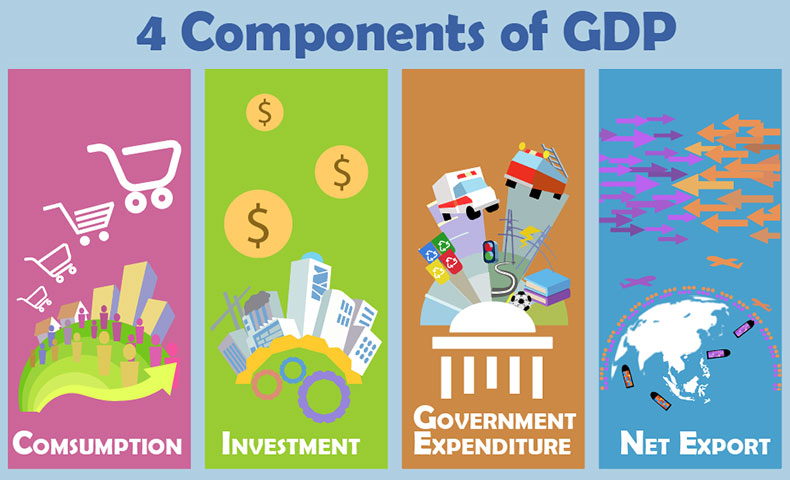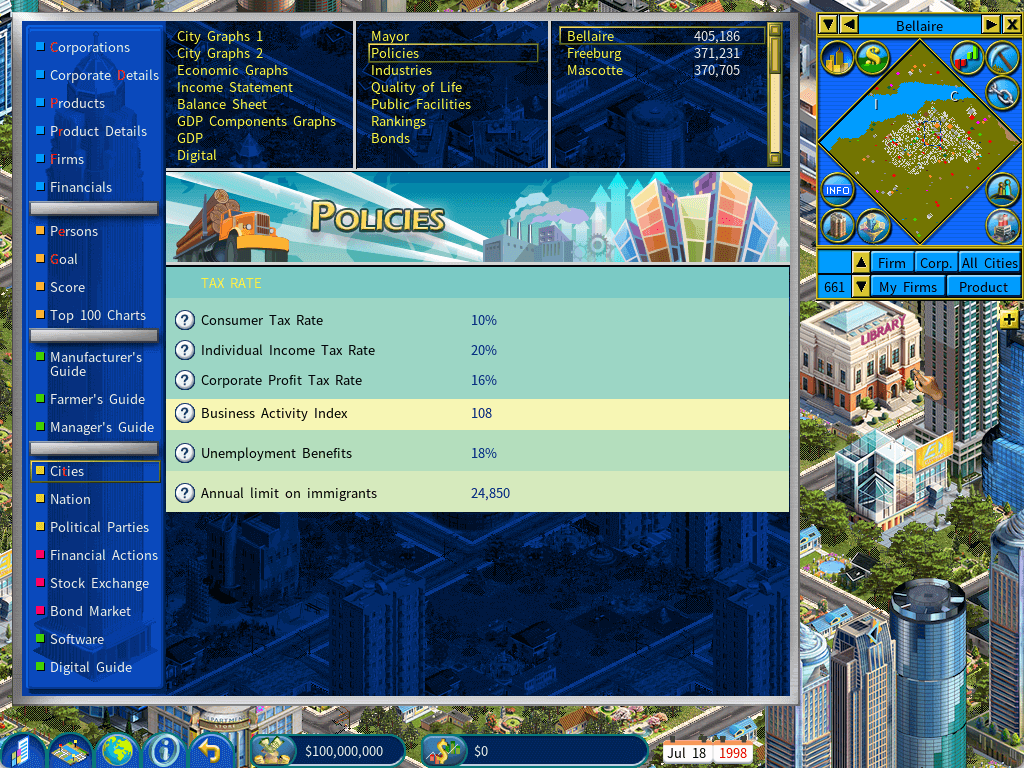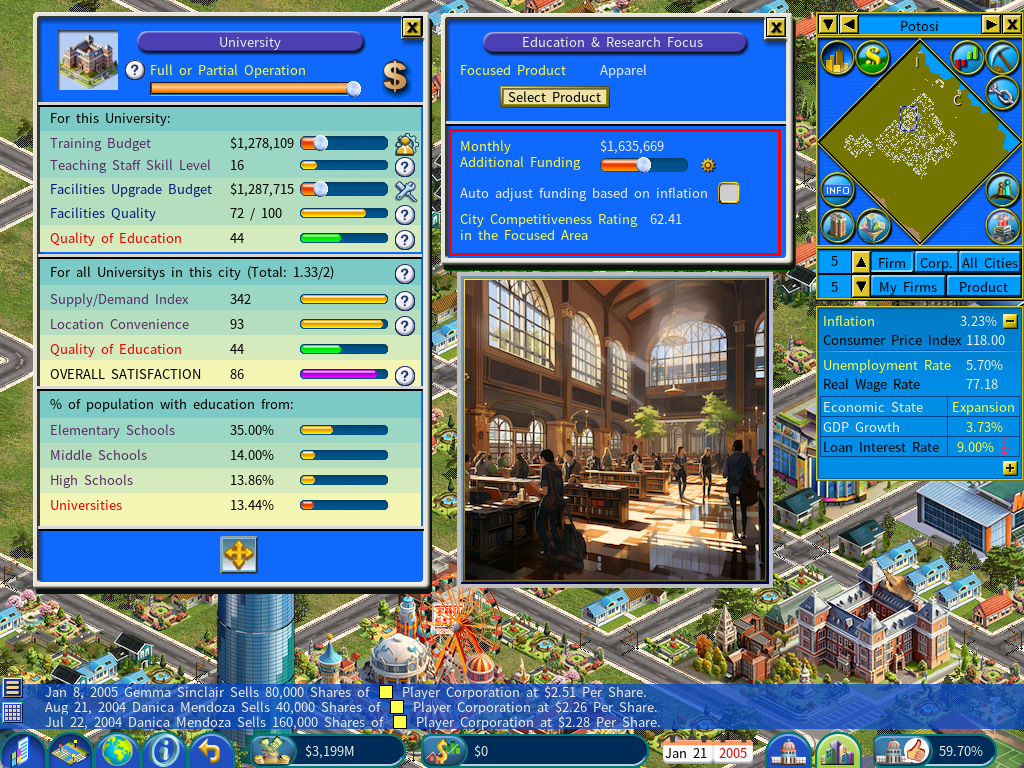Increasing GDP Growth in Capitalism Lab
Gross Domestic Product (GDP) represents the total value of all final goods and services produced within your city in a given timeframe. In Capitalism Lab, a higher GDP can boost citizen satisfaction and yield higher tax revenue, which makes understanding how to grow GDP critically important. GDP is made up of four main components:
- Consumption (the spending by citizens on goods and services)
- Investment (expenditures by businesses on construction and expansion)
- Government Spending (on infrastructure, healthcare, education, etc.)
- Net Exports (exports minus imports when trading with other cities)

Below, we’ll examine each component and offer strategies to strengthen them.
1. Consumption
Consumption refers to the total amount spent by citizens on goods and services. Essentially, the more income people have, the more they are likely to spend. In Capitalism Lab, various factors influence Consumption:

- Government Policy – Cutting Income Tax
Lowering the income tax rate allows people to keep a larger share of their earnings. This extra disposable income can lead to higher Consumption. However, reducing taxes also decreases government revenue, which may limit how much you can spend on public services. - Government Policy – Boosting Immigration
Encouraging new residents to move into your city increases the customer base for local businesses. A larger population can mean more Consumption but also places greater demands on housing and public services. - Actions by Private Corporations
By creating more jobs (e.g., setting up new businesses), you reduce unemployment. When more people are employed, Consumption typically rises.
2. Investment
Investment comprises the money businesses spend to expand capacity, improve technology, and grow operations. Promoting Investment rather than letting businesses hoard profits is key to GDP growth. Possible approaches include:
- Government Policy – Lowering Business Taxes
Reducing taxes for businesses allows them to keep more revenue. Ideally, they use this to build new factories, retail stores, and other facilities, boosting overall Investment. - Government Policy – Promoting Education and Product Specialization
By enhancing educational institutions (e.g., universities) and supporting research, you develop a highly skilled workforce. Better-educated workers and advanced research encourage businesses to innovate and expand into new markets. - Private Corporation Actions
As a private entity, you can directly drive Investment by establishing new companies and expanding existing ones.
3. Government Spending
Government Spending covers public expenditures such as infrastructure, healthcare, education, and research. Unlike Consumption and Investment—which often depend on individual or corporate choices—Government Spending is fully under your control:
- Budget Allocation and Priorities
As mayor, investing in new schools, hospitals, and similar projects can stimulate economic growth, for example by improving your workforce’s skills through better education. Avoid long-term budget deficits, as sustained overspending may force you to raise taxes or reduce spending later, potentially slowing growth. - Investing in Universities and Research
Direct funding for education contributes directly to GDP by counting as Government Spending. Enhanced education quality and research capabilities raise the city’s overall productivity.
4. Net Exports
Net Exports is the difference between what you sell to other cities (exports) and what you buy from them (imports). Positive net exports inject money into your local economy.
- Product Quality and Specialization
To export more than you import, your products must be appealing in global markets. Upgrading product quality through specialized university trainings can help your city’s goods stand out worldwide. - Minimizing Imports
Whenever feasible, manufacture goods locally. This limits money flowing out of your city. Some imports may still be necessary if domestic production is too costly or inefficient. Aim for a balanced strategy.
The Impact of University Specialization
Investing in specialized university research is a standout approach for sustainable growth, affecting all four GDP components:

- Government Spending
Allocating government funds to research and education automatically counts toward Government Spending. Better educational infrastructure or research leads to meaningful progress for the city. - Net Exports
Higher product quality, introduced through cutting-edge research, increases the global appeal of your goods. This boosts exports and reduces reliance on imports. - Investment
As demand for your improved products rises, businesses will need to expand, stimulating further Investment in factories, storefronts, and equipment. - Consumption
Strong exports inject additional income into the economy, which eventually makes its way into citizens’ pockets. Higher incomes lead to increased Consumption.
Balancing the Four Components
Consumption, Investment, Government Spending, and Net Exports are closely interconnected. For instance, lowering taxes can spur Consumption and Investment but may reduce government revenue. Enhanced education strengthens both Net Exports and Investment but requires a robust Government Spending plan. Consider these points:
- Monitor Tax Rates: Strive to balance encouraging market activity against ensuring adequate government funding.
- Develop Human Capital: Skilled workers and top-tier research facilities make your city a magnet for businesses.
- Manage Deficits Carefully: Short-term deficits can be useful, but develop a sound plan to stabilize finances in the long run.
- Leverage Feedback Loops: Adjusting one policy often affects other areas of the economy. Keep a close watch on your data and modify your approach as needed.
Conclusion
Achieving GDP growth in Capitalism Lab is a multifaceted endeavor. By refining policies around Consumption, fostering substantial Investment, judiciously spending government resources, stimulating Net Exports, and placing special emphasis on research-oriented university programs, you can create a virtuous cycle of economic expansion. This balanced strategy generates more tax revenue, greater income for residents, and a city that remains competitive on the global stage.
